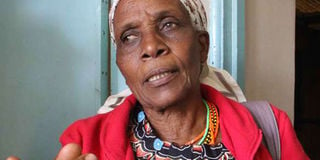At only 17, Ms Njoki Mwangi was given the role of spying for Mau Mau fighters

Former Mau Mau war veteran Grace Njoki speaks to Nation on May 31, 2016. PHOTO | JOSEPH KANYI | NATION MEDIA GROUP
What you need to know:
- Together with other girls, they would go to Tumu Tumu Hills to collect firewood and it is here that they would meet the fighters.
- Ms Mwangi, together with other girls in her village, would sit along a pathway near the hill every morning and evening to watch the fighters and over time, they spotted her and entrusted her with the role of spying for them.
- Ms Mwangi is among the veterans who were compensated in 2013 by the British Government for torture.
Ms Grace Njoki Mwangi was 17 years old when the Mau Mau uprising began. Most men in her village had gone to live in the forest, while the women and children had been left behind.
Ms Mwangi was among those who would give the fighters food and spy for them to find out the location of homeguards and British soldiers. Their actions saved the lives of over 1,000 young men from being killed or arrested by the colonialists in 1953, the year after the Mau Mau uprising began.
Together with other girls, they would go to Tumu Tumu Hills to collect firewood and it is here that they would meet the fighters.
The hill then, was densely forested and was a base area for the Mau Mau from which they would watch the colonialists’ movements and strategise on how to confront them.
It is at this place that the men taking part in the Mau Mau war would come in the evening, one by one, to eat food brought by family members or meet their kin after which they would return to the forest.
Ms Mwangi, together with other girls in her village, would sit along a pathway near the hill every morning and evening to watch the fighters and over time, they spotted her and entrusted her with the role of spying for them.
“They used say ‘Kairitu kau ga Tumu Tumu (that girl from Tumu Tumu)’ will help us know which direction to take,” she told the Nation.
They also nicknamed her Kangunio, a name she still enjoys to date. The name came from the village where she grew up.
She said at times the girls would join the fighters as a cover-up to make the colonialists think they were a group of women going about their duties.
FREEDOM FIGHTERS
This was before the Mau Mau war intensified and freedom fighters went deep into the Aberdare and Mt Kenya forests. “After war broke out, I followed them into the forest,” she said.
One night, they were ambushed together with the fighters and they were beaten up leaving her with a broken leg. She still limps because of the injury she sustained. “Everyone had to run in different directions for their safety. I was arrested and locked up in a temporary prison in the forest for five months,” she said.
Ms Mwangi is among the veterans who were compensated in 2013 by the British Government for torture.
The veterans used to pass through river Sagana through farms in Gatiki area in Mukurweini then to the TumuTumu hill forest then to River Langat and Mutitu forest.
“As months went on they composed a song which they used to sing every time they pass near our home and I would mobilize other girls to accompany me to take food to them,” said Ms Mwangi.
While in the forest, one night, she was ambushed together with other veterans and were beaten up causing her to break one of her legs. She still limps because of the injury she sustained.
“Everyone had to run different directions for their safety, I was arrested and locked up in a temporary prison in the forest for five months.
There I found hundreds of other women and children who had been forcefully ejected out of their homes by the colonialists,” she said.
When the war ended she went back to her village only to find that many of her age mates and neighbours had been killed in the war.
As the country celebrates the Mashujaa day, on Wednesday Ms Mwangi is a proud woman who counts herself as among veterans who played a major role in fighting for the independence of this country.





